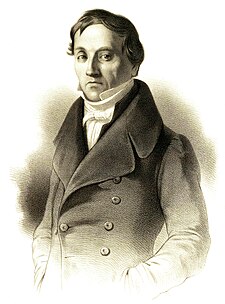Karl Ernst Ritter von Baer, Edler von Huthorn was an Estonian scientist and explorer. Baer is also known in Russia as Karl Maksimovich Baer (Russian: Карл Макси́мович Бэр).
Baer was a naturalist, biologist, geologist, meteorologist, geographer, and a founding father of embryology. He was an explorer of European Russia and Scandinavia. He was a member of the Russian Academy of Sciences, a co-founder of the Russian Geographical Society, and the first president of the Russian Entomological Society, making him a distinguished Baltic German scientist.
 von Baer studied the embryonic development of animals, discovering the blastula stage of development and the notochord. Together with Heinz Christian Pander and based on the work by Caspar Friedrich Wolff, he described the germ layer theory of development (ectoderm, mesoderm, and endoderm) as a principle in a variety of species, laying the foundation for comparative embryology in the book Über Entwickelungsgeschichte der Thiere (1828). In 1826, Baer discovered the mammalian ovum. The first human ovum was described by Edgar Allen in 1928. In 1827, he completed research Ovi Mammalium et Hominis genesi for St Petersburg's Academy of Science (published at Leipzig) and established that mammals develop from eggs.
von Baer studied the embryonic development of animals, discovering the blastula stage of development and the notochord. Together with Heinz Christian Pander and based on the work by Caspar Friedrich Wolff, he described the germ layer theory of development (ectoderm, mesoderm, and endoderm) as a principle in a variety of species, laying the foundation for comparative embryology in the book Über Entwickelungsgeschichte der Thiere (1828). In 1826, Baer discovered the mammalian ovum. The first human ovum was described by Edgar Allen in 1928. In 1827, he completed research Ovi Mammalium et Hominis genesi for St Petersburg's Academy of Science (published at Leipzig) and established that mammals develop from eggs.
He formulated what became known as Baer's laws of embryology:
General characteristics of the group to which an embryo belongs develop before special characteristics.
General structural relations are likewise formed before the most specific appear.
The form of any given embryo does not converge upon other definite forms, but separates itself from them.
The embryo of a higher animal form never resembles the adult of another animal form, such as one less evolved, but only its embryo.
No comments:
Post a Comment